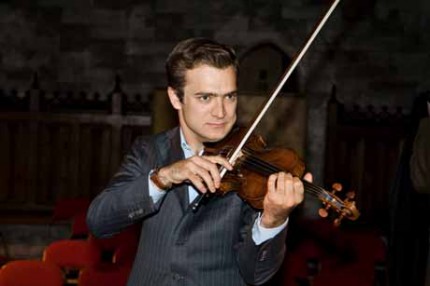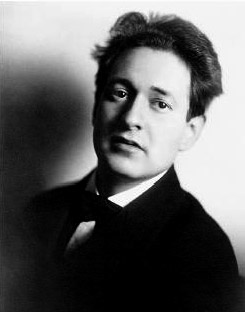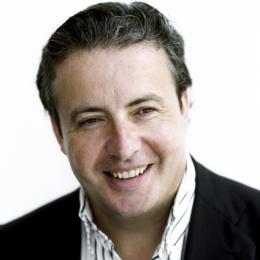Violinist Capuçon makes outstanding debut with CSO

This week’s Chicago Symphony Orchestra concerts were to mark the debut of Yannick Nézet-Séguin, the 35-year-old conductor who was tapped last June to be the next music director of the Philadelphia Orchestra.
The young French-Canadian hotshot, however, canceled his Chicago commitment on short notice because he’s just too tired and busy and—he seems to think—too important to be bothered with inconsequential things like a Chicago Symphony Orchestra debut. A statement by the conductor released by the Philadelphia Orcehstra stated “Due to an overly taxing fall schedule, I made the extremely difficult decision to create additional time in my schedule for rest and study.” Nice career move, buddy. Enjoy the nappie, and don’t hold your breath waiting for a second CSO invitation.
Taking over podium duties was Juanjo Mena, who has appeared at Grant Park but is here making his CSO debut. Recently appointed chief conductor of the BBC Philharmonic, Mena has enjoyed a busy guest conducting career, mostly with second- and third-tier European and American orchestras.
If Mena’s performances weren’t the most penetrating or individual ever heard, they were solid and musical, and he showed a clear sympathy with the works of Ravel and Tchaikovsky.
But it was the debut of the French violinist Renaud Capuçon that provided the evening’s clear highlight in Korngold’s Violin Concerto.
Many Chicagoans of a certain generation (ok, mine) likely had their first encounter with music of Erich Wolfgang Korngold through his film scores, in Sunday afternoons spent watching Errol Flynn buckling swashes on WGN’s Family Classics.

Korngold was a child prodigy on a Mozart level, pronounced a genius at age 10 by Mahler. He enjoyed remarkable acclaim as a composer while still in his teens, culminating in the widespread success of his hit opera Die tote Stadt at age 20 (largely neglected today, the opera contains the most drop-dead beautiful duet in the entire canon, Gluck, das mir verblieb). With the rise of the Nazis, the composer fled Vienna for the U.S., settling in California and his second career as a film composer for Warner Brothers.
Korngold’s Violin Concerto straddles his two careers. Written in 1945, it hails from his post-Hollywood period when he returned to composing for the concert hall, but draws its themes from several of his motion picture scores (notably, The Prince and the Pauper, Anthony Adverse and Juarez).
Capuçon clearly possesses a sterling technique and has a feel for the ripely melodic essence of Korngold’s enjoyable confection. The violinist offered a decidedly French take on Korngold, more intimated scaled and elegant.
Some may feel Capuçon’s slender timbre misses out on some of the silver-screen brassiness, yet the soloist showed himself able to handle all the complexities with a notably fiery cadenza and blazing with confidence through the fireworks of the finale–albeit taking the double-reverse coda at a rather cautious tempo.
Capucon’s performance was at its finest, however, in the central Romance, drawing out the wistful expression of this intimate reverie. The violinist’s encore was on the same level, a poised and delicately shaded Melodie from Gluck’s Orfeo ed Euridice.
Mena’s accompaniment was a mixed bag at best. Overly solicitous of his soloist, Mena kept the orchestra dynamics down in the first movement in a way that threatened to dilute the sumptuous essence of the music. Also there were repeated moments when the orchestra was out of synch with the soloist, largely due to Mena’s dawdling at ends of phrases and not pressing the music forward.

If the Spanish conductor didn’t show himself as much of an accompanist, he proved a more worthy musician in the two non-concertante works.
The evening began with Ravel’s Valses nobles et sentimentales. Launched with a brassy opening, the conductor showed a sure hand in Ravel’s shifting dance rhythms, drawing playing of lilting grace from the orchestra. Mena also displayed an idiomatic feel for the strain of Spanish color in this music, nicely pointing up the contrasts in tempos and expression. The orchestra’s playing proved both refined and flexible, aided by Mathieu Dufour’s evocative and languorous flute solo.
Mena didn’t quite manage to plumb the true depths of bleak tragedy in the finale of Tchaikovsky’s Pathetique symphony–nor get the rarefied pianissimos asked for at the coda—-but his was a largely admirable performance. With responsive playing by the musicians, the long first movement was skillfully assayed with an explosive frisson to the dramatic central section, Mena also brought apt martial vigor to the third movement march, eliciting the usual premature applause.
The program will be repeated 1:30 p.m. Friday, 8 p.m. Saturday, and 3 p.m. Sunday. cso.org; 312-294-3000.
Posted in Performances





Posted Jan 16, 2011 at 10:35 am by Brian
While you pride yourself in snarky witticisms and the ability to downplay any event, despite its actual magnitude, the real fact is this: you have no real talent. Do you think by including the phrase, “nor get the rarefied pianissimos asked for at the coda,” you’ve convinced us that you’re well educated in the music field? Basically that says, “he wasn’t able to get the CSO to play quiet enough!” The musicians of the CSO can fully bring out the emotion of Pathetique, with or without a conductor. So I say – Please go take a walk down self-reflection lane and contemplate doing something worthwhile for the community for once in your “Pathetique” life.
Posted Jan 16, 2011 at 10:38 am by Mike
Cancelling performances at the CSO because he’s tired? I wonder where he got the idea that that was okay…
Posted Jan 18, 2011 at 9:55 pm by Mike
Brian is right. Mr. Johnson clearly is incompetent for listening to music with a critical ear and writing about a concert in an eloquent, thoughtful way, which fell in line with many other local critics including those who rarely write anything negative. Plus, he didn’t even use a single cheesy pun. Keep up the good fight Brian.